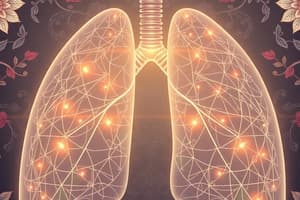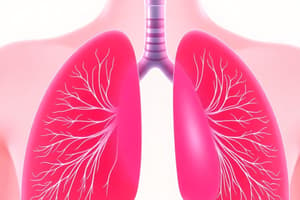Podcast
Questions and Answers
What is the formula for calculating Inspiratory Capacity (IC)?
What is the formula for calculating Inspiratory Capacity (IC)?
- IC = TV + RV
- IC = TV + ERV
- IC = TV + VC
- IC = TV + IRV (correct)
Which factor does NOT affect Vital Capacity (VC)?
Which factor does NOT affect Vital Capacity (VC)?
- Strength of respiratory muscles
- Age
- Humidity levels (correct)
- Size of thoracic cavity
What is the maximum volume of air that can be expired after normal tidal inspiration called?
What is the maximum volume of air that can be expired after normal tidal inspiration called?
- Total Lung Capacity
- Residual Volume
- Expiratory Capacity (correct)
- Inspiratory Capacity
Which of the following lung capacities equals 5700 ml?
Which of the following lung capacities equals 5700 ml?
If the Tidal Volume (TV) is 500 ml, Inspiratory Reserve Volume (IRV) is 3000 ml, and Expiratory Reserve Volume (ERV) is 1500 ml, what is the Vital Capacity (VC)?
If the Tidal Volume (TV) is 500 ml, Inspiratory Reserve Volume (IRV) is 3000 ml, and Expiratory Reserve Volume (ERV) is 1500 ml, what is the Vital Capacity (VC)?
What is the tidal volume (TV) during normal breathing?
What is the tidal volume (TV) during normal breathing?
Which volume represents the air that remains in the lungs after forceful expiration?
Which volume represents the air that remains in the lungs after forceful expiration?
Which of the following is the primary mechanism driving pulmonary ventilation?
Which of the following is the primary mechanism driving pulmonary ventilation?
What is the inspiratory reserve volume (IRV) for males according to the provided data?
What is the inspiratory reserve volume (IRV) for males according to the provided data?
Which process occurs between the air in the lungs and the blood in the alveoli?
Which process occurs between the air in the lungs and the blood in the alveoli?
What volume can be exhaled forcefully above the tidal volume?
What volume can be exhaled forcefully above the tidal volume?
Which process is primarily responsible for transporting O2 and CO2 in the blood?
Which process is primarily responsible for transporting O2 and CO2 in the blood?
What does the expiratory reserve volume (ERV) measure?
What does the expiratory reserve volume (ERV) measure?
Flashcards are hidden until you start studying
Study Notes
Respiratory System
- The respiratory system is responsible for the process of respiration, which involves breathing, gas exchange, and gas transport.
Respiration
- Pulmonary Ventilation (Breathing): The physical movement of air into and out of the lungs, requiring pressure gradients.
- Gas Exchange: Involves gas diffusion, specifically external respiration (between air in lungs and blood in alveoli) and internal respiration (between blood & other tissues).
- Gas Transport: Transport of oxygen (O2) and carbon dioxide (CO2) in the blood between the alveolar capillaries and the capillary beds in other tissues.
Lung Volumes and Capacities
- Lung Volumes are the maximum volume to which a lung can be expanded. They are divided into four non-overlapping volumes:
- Tidal Volume (TV): Volume of air inspired or expired with each breath during normal quiet breathing (approximately 500 ml).
- Inspiratory Reserve Volume (IRV): The extra volume of air that can be inhaled by a maximum inspiratory effort over and above the normal tidal volume (approximately 3000 ml).
- Expiratory Reserve Volume (ERV): The extra volume of air that can be exhaled by a maximum forceful expiration over and above the normal tidal volume (approximately 1000 ml).
- Residual Volume (RV): Volume of air that remains in the lungs after the most forceful expiration (approximately 1200 ml).
Lung Capacities
- Lung Capacities are combinations of two or more lung volumes. They include:
- Inspiratory Capacity (IC): Maximum volume of air that can be inspired after a normal tidal expiration (IC = TV + IRV).
- Expiratory Capacity (EC): Maximum volume of air that can be expired after a normal tidal inspiration (EC = TV + ERV).
- Vital Capacity (VC): Maximum volume of air that a person can expel after the deepest possible inspiration (VC = TV + IRV + ERV). This can be affected by factors like thoracic cavity size, age, strength of respiratory muscles, gravity, pregnancy, and pulmonary diseases.
- Total Lung Capacity (TLC): Volume of air present in the lungs after maximal inspiration (TLC = VC + RV).
Spirometer
- A spirometer measures the rate at which the lung changes volume.
Studying That Suits You
Use AI to generate personalized quizzes and flashcards to suit your learning preferences.




